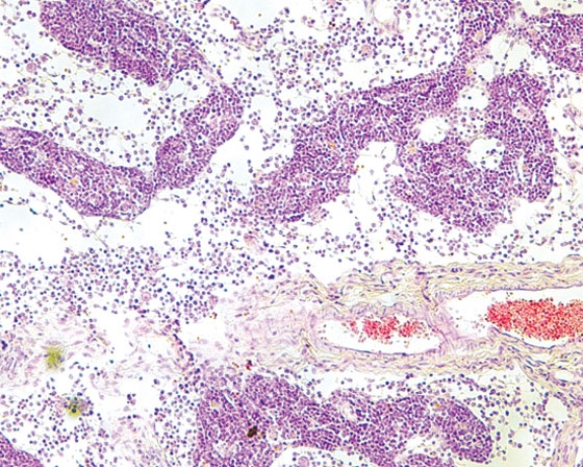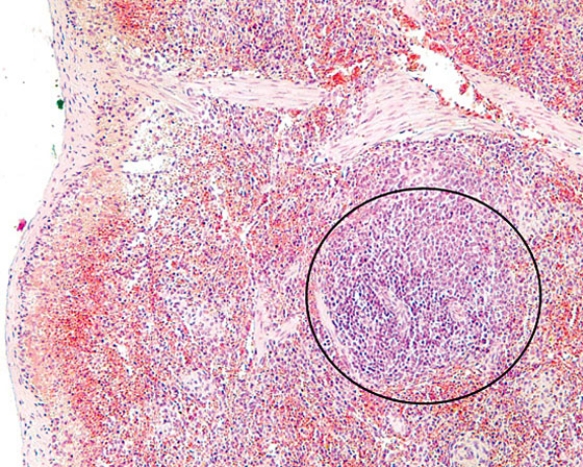Deck 11: Lymphoid Immune System
Question
Question
Question
Question
Question
Question
Question
Question
Question
Question
Question
Question
Question
Question

Unlock Deck
Sign up to unlock the cards in this deck!
Unlock Deck
Unlock Deck
1/14
Play
Full screen (f)
Deck 11: Lymphoid Immune System
1
Which of the following relates to the innate immune system?
A) it is slower than the adaptive immune system
B) it has immunologic memory
C) it exhibits specificity
D) it depends on Toll-like receptors
E) it has diversity
A) it is slower than the adaptive immune system
B) it has immunologic memory
C) it exhibits specificity
D) it depends on Toll-like receptors
E) it has diversity
D
2
Clonal expansion is dependent on which of the following cells?
A) effector cells
B) plasma cells
C) memory cells
D) virgin cells
E) naïve cells
A) effector cells
B) plasma cells
C) memory cells
D) virgin cells
E) naïve cells
C
3
Which of the following is a primary (central) lymphoid organ?
A) thymus
B) lymph node
C) spleen
D) pharyngeal tonsil
E) palatine tonsil
A) thymus
B) lymph node
C) spleen
D) pharyngeal tonsil
E) palatine tonsil
A
4
A child 6 years of age sees his pediatrician for repeated infections and developing blood in his diarrhea. The physician orders a complete blood count, and the results show very low platelet count and a low lymphocyte levels. Because the little boy also has eczema, the pediatrician suspects Wiskott-Aldrich syndrome. Children with this disease
A) have high T cell count and low B cell count
B) high B cell count and low T cell count
C) high T cell count and high B cell count
D) low T cell count and low B cell count
E) high erythrocyte count
A) have high T cell count and low B cell count
B) high B cell count and low T cell count
C) high T cell count and high B cell count
D) low T cell count and low B cell count
E) high erythrocyte count

Unlock Deck
Unlock for access to all 14 flashcards in this deck.
Unlock Deck
k this deck
5
Thymic corpuscles (Hassall corpuscles) are composed of
A) type I reticular cells
B) type III reticular cells
C) type IV reticular cells
D) type V reticular cells
E) type VI reticular cells
A) type I reticular cells
B) type III reticular cells
C) type IV reticular cells
D) type V reticular cells
E) type VI reticular cells

Unlock Deck
Unlock for access to all 14 flashcards in this deck.
Unlock Deck
k this deck
6
Graves' disease is an autoimmune disorder in which the person forms antibodies against his or her
A) thyroid-stimulating hormone (TSH)
B) thyroxine
C) thyroid gland
D) parathyroid gland
E) TSH receptors
A) thyroid-stimulating hormone (TSH)
B) thyroxine
C) thyroid gland
D) parathyroid gland
E) TSH receptors

Unlock Deck
Unlock for access to all 14 flashcards in this deck.
Unlock Deck
k this deck
7
Which of the following cells possesses CD8 molecules?
A) TH0
B) TH1
C) TH2
D) T reg
E) CTL
A) TH0
B) TH1
C) TH2
D) T reg
E) CTL

Unlock Deck
Unlock for access to all 14 flashcards in this deck.
Unlock Deck
k this deck
8
The innate immune system relies on
A) natural killer cells
B) T helper cells
C) T killer cells
D) B memory cells
E) B effector cells
A) natural killer cells
B) T helper cells
C) T killer cells
D) B memory cells
E) B effector cells

Unlock Deck
Unlock for access to all 14 flashcards in this deck.
Unlock Deck
k this deck
9
This photomicrograph represents the 
A) cortex of a lymph node
B) medulla of a lymph node
C) cortex of the thymus
D) medulla of the thymus
E) white pulp of the spleen

A) cortex of a lymph node
B) medulla of a lymph node
C) cortex of the thymus
D) medulla of the thymus
E) white pulp of the spleen

Unlock Deck
Unlock for access to all 14 flashcards in this deck.
Unlock Deck
k this deck
10
The marginal zone belongs to which of the following structures?
A) lymph node
B) lymphoid nodule
C) spleen
D) thymus
E) pharyngeal tonsil
A) lymph node
B) lymphoid nodule
C) spleen
D) thymus
E) pharyngeal tonsil

Unlock Deck
Unlock for access to all 14 flashcards in this deck.
Unlock Deck
k this deck
11
The region inside the circle is the 
A) cortex of a lymph node
B) medulla of a lymph node
C) cortex of the thymus
D) medulla of the thymus
E) white pulp of the spleen

A) cortex of a lymph node
B) medulla of a lymph node
C) cortex of the thymus
D) medulla of the thymus
E) white pulp of the spleen

Unlock Deck
Unlock for access to all 14 flashcards in this deck.
Unlock Deck
k this deck
12
A patient is producing an antibody isotype that is composed of a dimer held together by J protein and is secreted into his saliva. Which of the following isotypes is being produced by this patient?
A) IgA
B) IgD
C) IgE
D) IgG
E) IgM
A) IgA
B) IgD
C) IgE
D) IgG
E) IgM

Unlock Deck
Unlock for access to all 14 flashcards in this deck.
Unlock Deck
k this deck
13
The adaptive immune system relies on
A) natural killer cells
B) T helper cells
C) neutrophils
D) macrophages
E) complement
A) natural killer cells
B) T helper cells
C) neutrophils
D) macrophages
E) complement

Unlock Deck
Unlock for access to all 14 flashcards in this deck.
Unlock Deck
k this deck
14
The membrane attack system is the body's innate defense system against microbial attack. Which of the following components of the complement system plays a key role in this defense?
A) C2
B) C3
C) C4
D) Factor B
E) Factor D
A) C2
B) C3
C) C4
D) Factor B
E) Factor D

Unlock Deck
Unlock for access to all 14 flashcards in this deck.
Unlock Deck
k this deck


